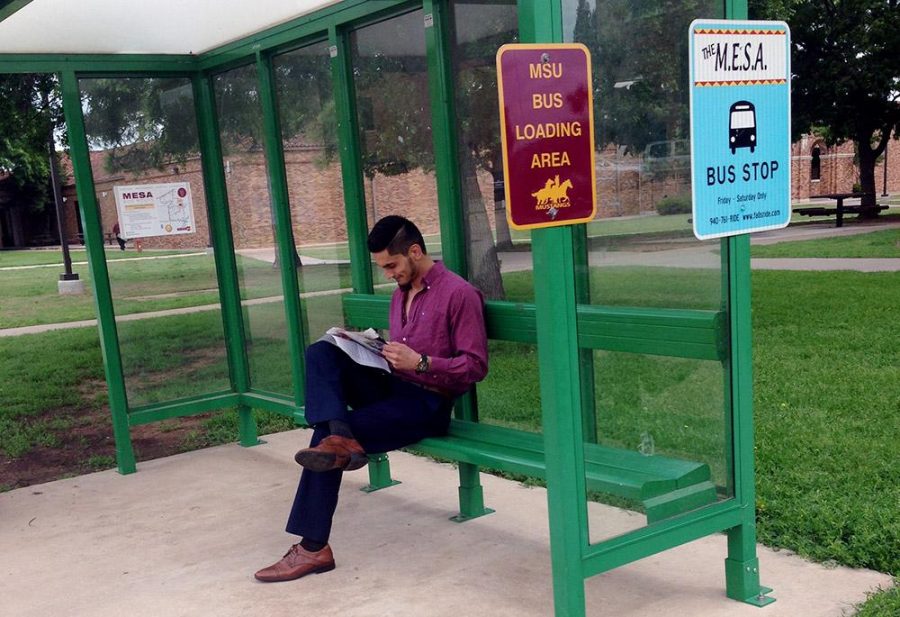Taco Bell. Chic-fil-A. McDonald’s. Whataburger. Jack in the Box. Dairy Queen. Sonic Drive-in. Canes. Chipotle.
The list is almost endless.
The food is convenient. And relatively inexpensive.
It’s also full of calories.
And, for freshman, the convenience and calories lead to the infamous Freshmen 15.
According to a study published in 2008 in Nutrition Journal, one in four college freshmen gain at least 5 percent of their body weight in just their first semester.
Caleb Hannon, assistant director of the Wellness Center, said coming to college may be the first time students have had to be responsible for their own healthy lifestyle habits.
“Whether it be students never having been challenged with picking what they’re eating themselves, or students never having the leadership of a coach or someone telling them when to work out or how to work out.”
Jane Leach, graduate coordinator of the master nursing program, said the typical lifestyle of a college student can also be to blame.
“There’s not somebody sitting there saying you should go to bed and keep your sleep cycle normal,” Leach said. “You still have to go to an eight o’clock class on Monday, which makes you grab things to drink or eat that aren’t healthy and it’s because your sleep cycle is all messed up.”
College Lifestyle Fosters Unhealthy Habits
Sometimes students fall into the habit of staying up late, snacking on unhealthy food and waking up late in the afternoon. This takes away from the ability to eat a protein-full breakfast.
“That encourages that late night eating that college students are so famous for,” Leach said. “If you’re awake at midnight, you’re going to want a pizza, you’re going to want to go to Taco Bell, you’re going to want to eat a bunch of stuff.”
Another routine that students may get into is the habit of eating fast foods because they are convenient and filling. Although fast food is easy to eat, it may not always be the best choice nutritionally.
“I remember as a freshman it was easy to get grilled cheese every day at lunch,” Stephanie Baker, assistant professor of the Wilson school of nursing, said. “It was quick and easy and good, but it wasn’t balanced nutrition. It’s something I struggled with in the cafeteria.”
Typical college events such as hanging out with friends after a game, while fun, can lead to unhealthy habits.
“Saturday night we went to the football game, and because somebody made a field goal, you could go to Cane’s chicken and buy one get one free,” Leach said. “Well, who didn’t go to Cane’s to get the buy one get one free? All those that had tickets to get into the game, you know they’re not going to waste it. Would they have eaten Cane’s chicken at midnight otherwise? Probably not.”
Besides eating unhealthy foods, drinking certain things can also cause weight gain. Energy drinks and sodas contain large amounts of sugar and caffeine that can deteriorate your bones if consumed in large amounts.
“Where a lot of students get their extra calories is their drinks,” Leach said. “It’s so easy to think that it’s just one Coke or one Dr Pepper, then next thing you know you’re refilling it because there’s free refills, then you’ve had three sodas with your meal.”
Leach recommends drinking coffee or tea without a lot of sugar because it is better for you and will help control the amount of calories consumed. Baker said drinking more water can improve students’ health as well.
“People don’t realize that they’re not drinking enough water throughout the day,” Baker said. “It keeps you hydrated, and being dehydrated can make you feel tired and fatigued. If you’re tired and fatigued then you’re not paying attention in class, you’re less likely to work out, you’re not sleeping as well because your sleep isn’t quality if it’s artificial.”
Find a Routine
Establishing a work-out routine is one way to burn off calories. Baker said creating a work-out schedule early in the semester and sticking with it by exercising with friends is an effective way to stay active.
“Some healthy habits that we like to tell people are getting into a workout routine,” Hannon said. “Even if it’s just two to three times a week, having a routine that they know that their body is ready to work out is definitely a plus and a great way for them to start.”
The wellness center on campus offers group fitness classes and recreational sports. The advisers at the wellness center are available to help students get started on a workout routine.
“The food that students eat nowadays can add up a lot of calories quickly.,” Hannon said, “Being able to have somewhere to be able to burn those calories in a fun environment, a safe environment, is a great way for them to be able to burn off what they eat which may not always be the healthiest things.”
Both Leach and Baker said finding balance in a schedule is ideal for starting a fitness routine as a college student. Baker said doing something such as flag football or disk golf is a way to work out and still have fun while balancing a college schedule.
“Intuitively, we know that we need to have ‘x’ amount of hours of sleep, we know what we should eat,” Leach said. “People know what they’re supposed to do – it’s a matter of finding that balance.”
Leach said being a new college student can create situations where there is a lot to adapt to that may put stress on students. She said some students may find ways to make themselves feel better that are not always healthy.
“There’s a lot of things that happen in the college experience that push the balance one direction or the other,” Leach said. “Yes, it’s normal to want to stay up later because you’re having a great time, but your full-time job is supposed to be to study. On the other hand, nobody wants to study all the time. It’s all about finding that balance. How can you have that balance and still have a good time, and still make good decisions?”
QUESTION AND ANSWER
What are ways of watching a calorie count?
Hannon: “Watching their portion size when they eat, and being aware of what their eating. Sometimes things may seem healthy but in all reality there might be some underlying sugars that their not really sure about that’s in their food.”
Leach: “You moderate your calories the most by observing what you drink. Switch to water, or tea that’s not sweet or coffee. It’s probably better to drink coffee without a bunch of sugar in it than it is to be drinking sodas. Sodas are really bad for your bones, and they’re certainly bad for your teeth.”
How can unhealty sleep habits have bad effects?
Leach: “When you stay up all night, and don’t sleep well, and don’t rest well, you’re going to do other things to make you feel better. When you wake up in three in the afternoon because you’ve slept half the day on Sunday and you’re ravenous and now there’s not the choice of having your typical protein breakfast.”
Baker: “Sleep affects your overall wellbeing. Enough sleep and quality of sleep is really important. Whatever that means with your roommate and you balancing your schedule, and coming to an agreement that you’re not going to leave the tv on all night.”
What are sugestions for staying active as a freshmen?
Hannon: “Try new things, ask as many questions as possible to health professionals, and then for people that have never worked out before, come give our group fitness classes a try. They’re fun, nobody watches you do anything, and the instructor will help you through the class.”
Baker: “Find groups of friends, if you decide to go to the gym together or even if it’s different classes, at least you’re holding each other accountable to go. Try to incorporate a routine early on in the semester. Do something fun, like Frisbee golf or flag football.”
How are too many sugras bad for the body?
Hannon: “The more calories you put in your body and the less calories you burn, the more weight you’re going to gain. Looking at a label on food and seeing what’s in that food, a snack could have 100 calories in it, but it could have 22 grams of sugar, and once that sugar sits in your body it immediately turns into fat without you burning it off.”
Leach: “We’re all getting so much sugar from processed foods. A lot of it is the extra sugar that is added to everything that we pick up from processed foods. I’m a big proponent of eggs, they have proteins and are low in calories.”












